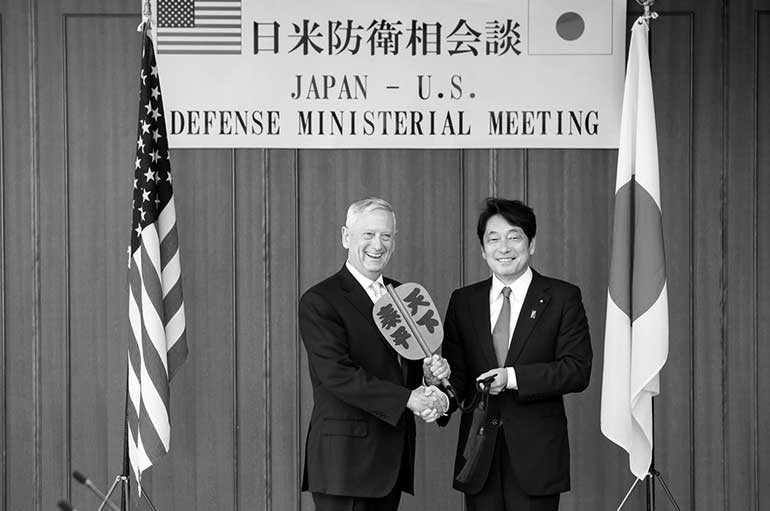Tuesday Feb 24, 2026
Tuesday Feb 24, 2026
Saturday, 30 June 2018 03:55 - - {{hitsCtrl.values.hits}}
TOKYO (Reuters): US Defence Secretary Jim Mattis sought to reassure Japan yesterday that Washington was mindful of its interests in talks with North Korea, during a stop in Tokyo that underscored the close US ally’s concerns about the negotiations.
Japan’s defence establishment was taken aback by the US President Donald Trump’s recent decision to halt “expensive” military exercises with South Korea that have long been seen in Tokyo as a deterrent to North Korea’s threats.
Trump’s 12 June summit with North Korean leader Kim Jong Un in Singapore also did not appear to resolve Japanese security concerns about a missile programme that Tokyo sees as a direct threat.
But Mattis, the most senior US administration official to visit Japan, reaffirmed the US goal of dismantling North Korea’s nuclear and ballistic missile programs. He said the US-Japan alliance “stands firm” and undiminished by US-North Korea talks.
“We’re in the midst of very unprecedented negotiations right now with North Korea. But in this dynamic time, the longstanding alliance between Japan and the United States stands firm,” Mattis said, standing alongside Defence Minister Itsunori Onodera.
Japanese Foreign Affairs Minister Taro Kono said the two allies needed to “keep our relations tight,” noting his concerns that international sanctions on North Korea remain in place until all of its weapons of mass destruction are eliminated – along with its ballistic missiles.
Tokyo has been repeatedly rattled in recent years by North Korean test missiles that have flown over Japan or landed in waters Japan claims as its exclusive economic zone.“So, there are a lot of things that still need to be worked on,” he told Mattis.
Japan, which hosts some 50,000 US military personnel, including the biggest overseas concentration of US Marines and a US Navy carrier strike group, relies on Washington for its defence.

In another nod to Japanese concerns, Mattis repeatedly noted Japanese abducted by North Korea to train its spies, even noting a lapel pin worn by Onodera.
“I note with respect the blue lapel pin you wear, and we’re with you,” Mattis remarked as he sat down for talks at the defence ministry. He later said the abductee issue was “always present in our deliberations.”
Japan has been pressing the United States to make the issue of the abductees a priority in its talks with North Korea.
US Ambassador William Hagerty hosted family members of Japanese abductees at his residence in Tokyo in April and regularly wears the pin and Trump raised the matter in Singapore.
Japan, which may seek direct talks with North Korea to discuss the return of any remaining abductees kidnapped during the 1970s and 1980s, has said it will not provide any economic aid to Pyongyang until the issue is resolved and normal diplomatic relations have been established.
Mattis was on the last stop of a week-long trip to Asia, where he offered similar reassurances to South Korea during a brief visit in Seoul on Thursday.
He assured the South Korean government of an “ironclad” commitment to its security, including keeping US troop levels there of around 28,500 soldiers.
In Seoul and Tokyo, he also defended Trump’s decision to halt “war games,” saying it would help diplomats negotiate.
“This decision was taken to create space for our diplomats to negotiate strongly and increasing the prospects for a peaceful solution on the peninsula,” Mattis said.
“At the same time, we maintain a strong collaborative defensive stance to ensure our diplomats continue to negotiate from a position of unquestioned strength.”
Many national security experts have questioned the move to halt the exercises, saying it was a major concession to the North that could over time erode the readiness of US and South Korean forces stationed on the peninsula.